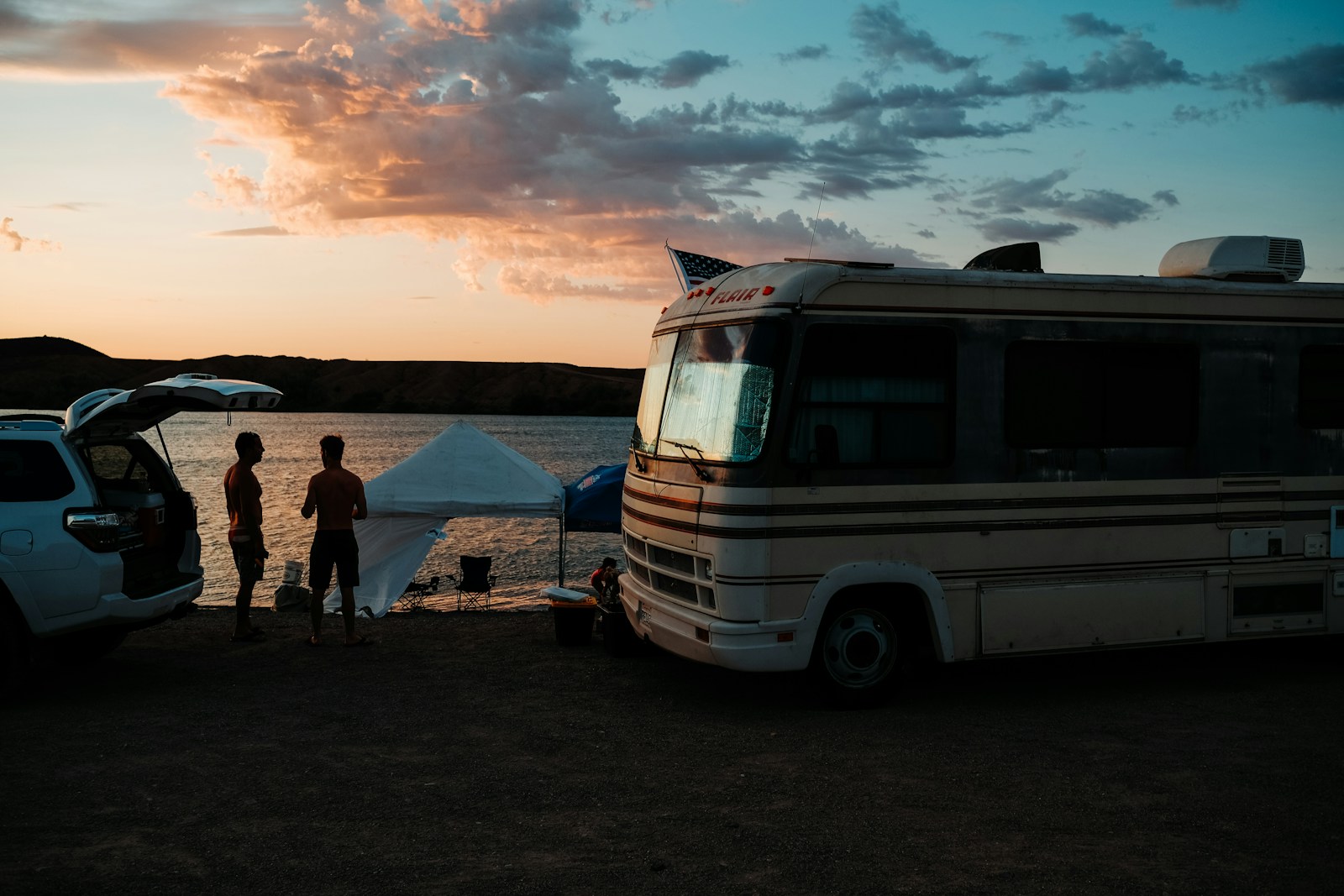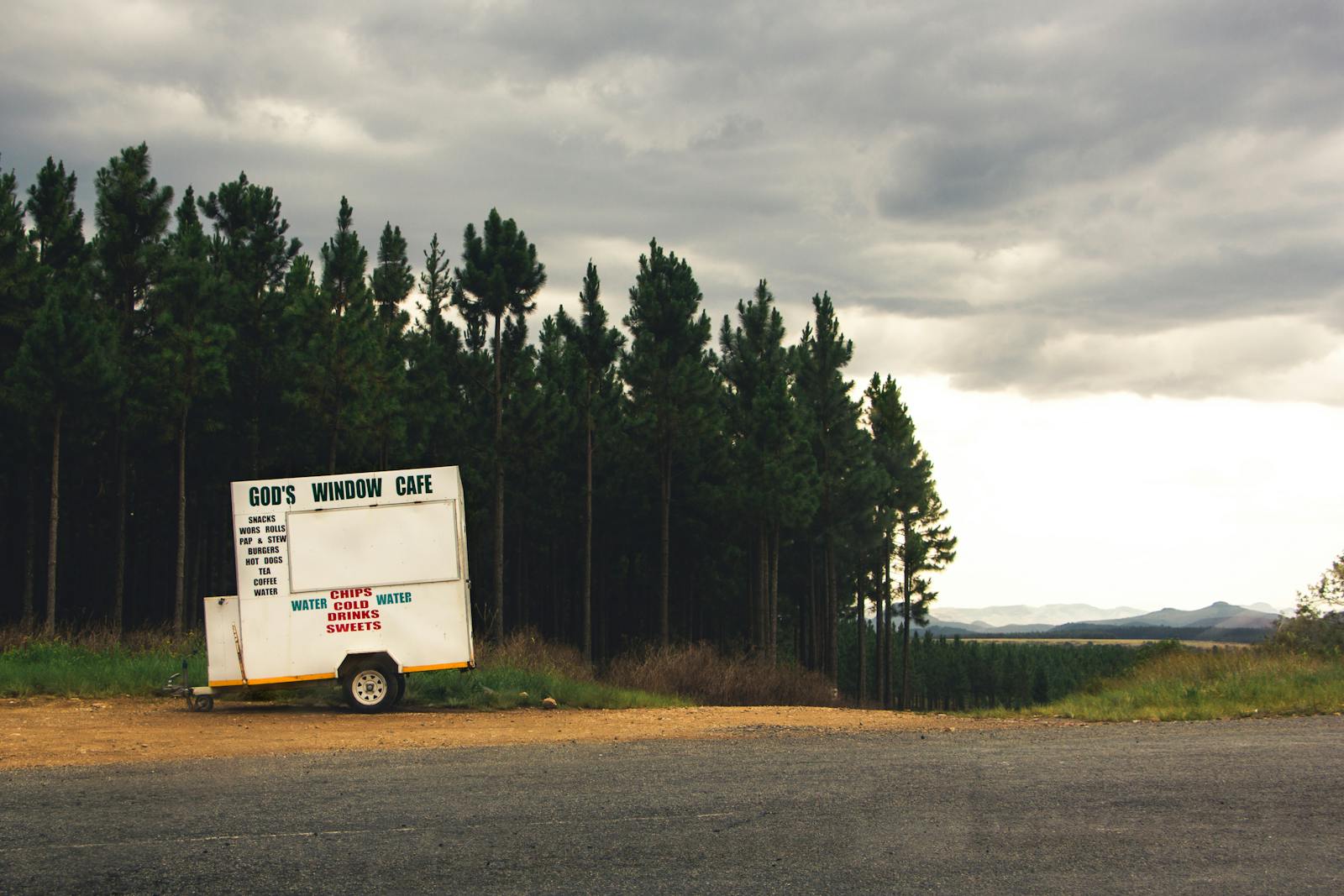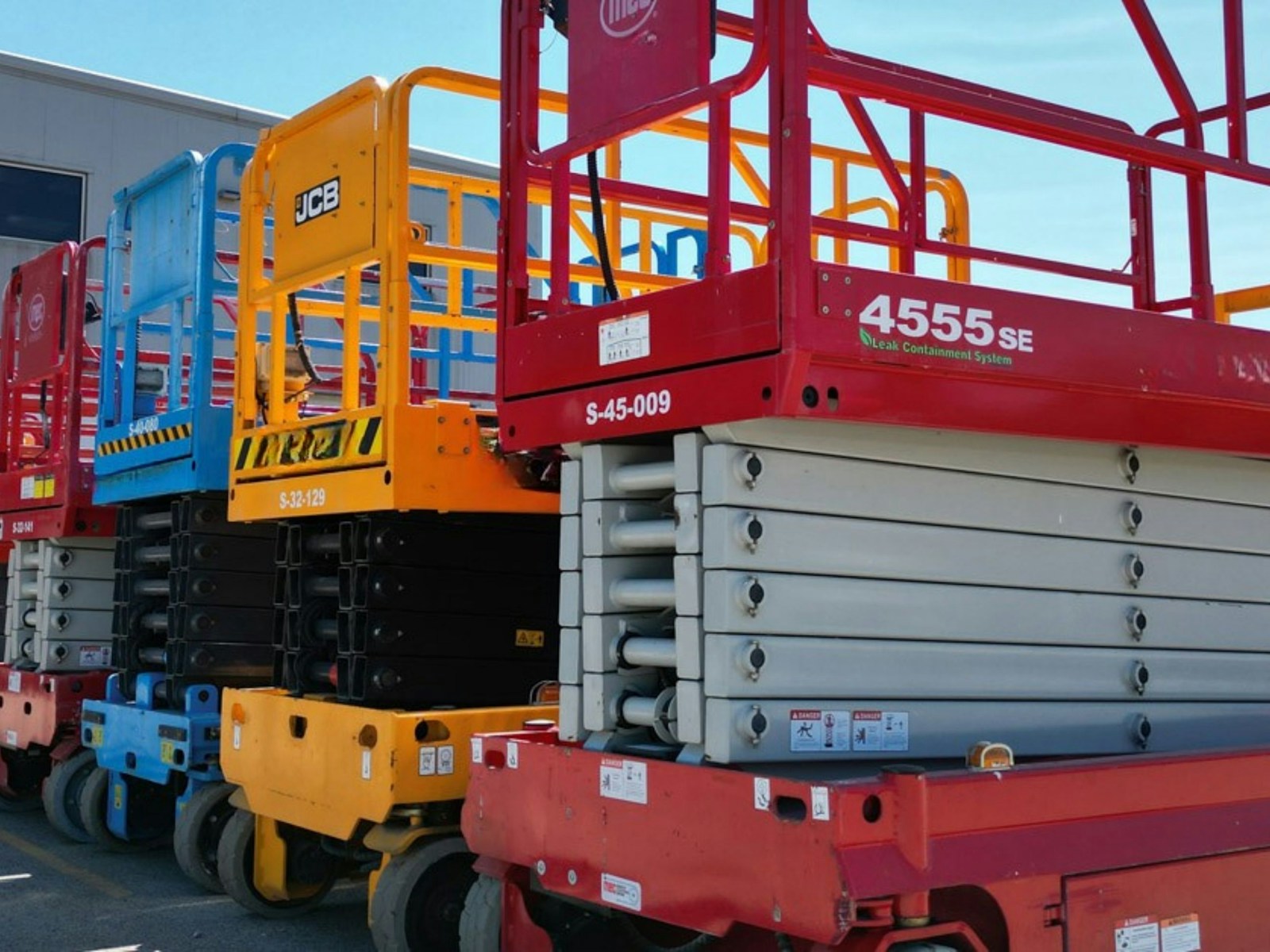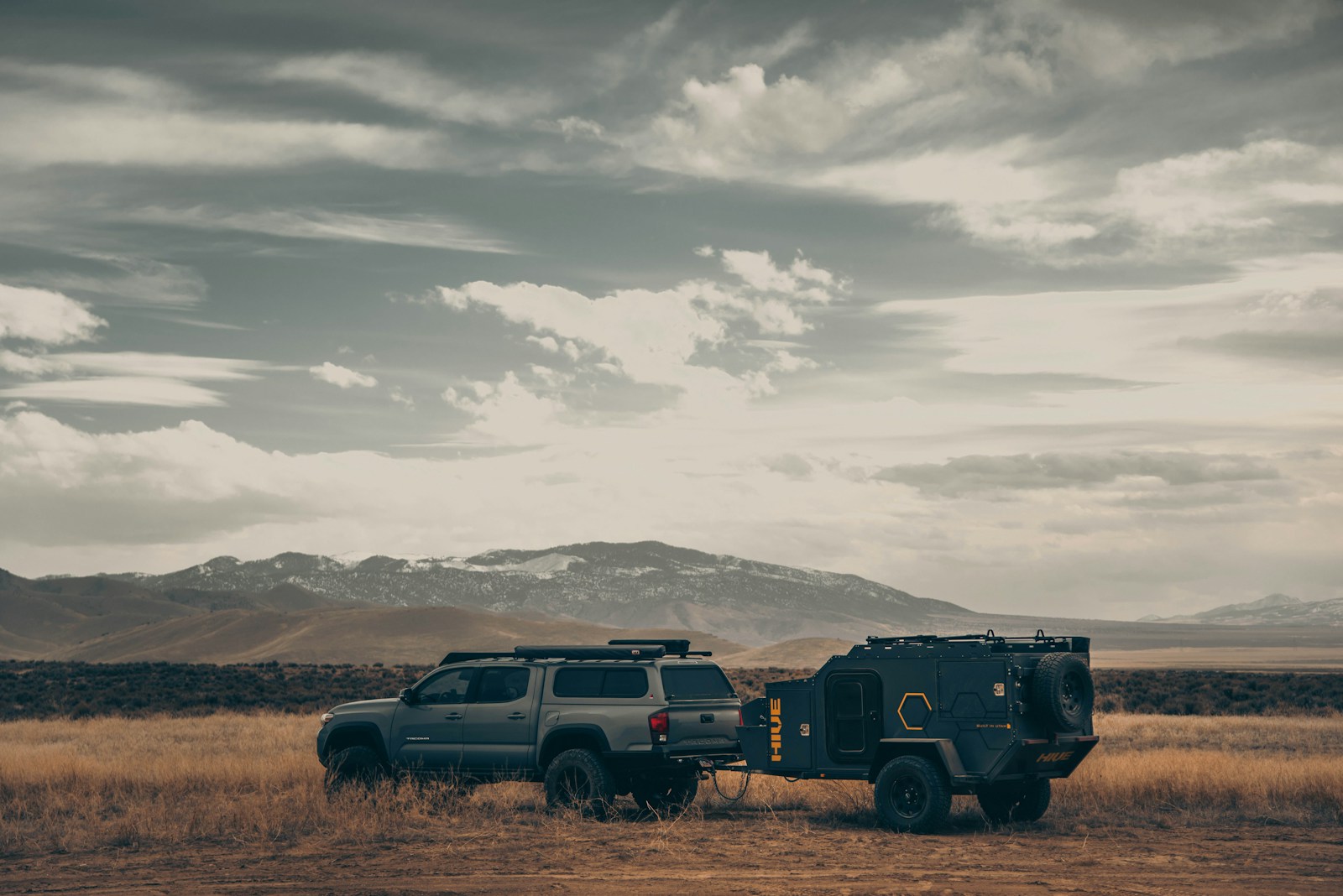The recreational vehicle industry has experienced remarkable growth, with manufacturers producing everything from compact toy haulers to luxury motorhomes. Choosing one for an RV manufacturers can be hard, and impacts not only your travel experiences but also long-term reliability, resale value, and transport considerations.
Whether you’re a first-time buyer or seasoned RVer, understanding the landscape of RV manufacturers helps you make informed decisions that align with your lifestyle and budget. Gaining this knowledge gives you a significant advantage when it comes to making better purchasing decisions and maximizing cost savings.
This comprehensive guide explores the major players in the RV industry, evaluates build quality from a transport professional’s perspective, and provides practical insights for long-term ownership. This article is designed to guide RV owners through the complexities of the industry by offering detailed, actionable advice and industry insights.
We’ll examine everything from manufacturing facilities to the infamous 10-year rule that affects RV transport options. If you’re curious about how RVs are made or want to deepen your understanding of the industry, this article will provide the information you need.
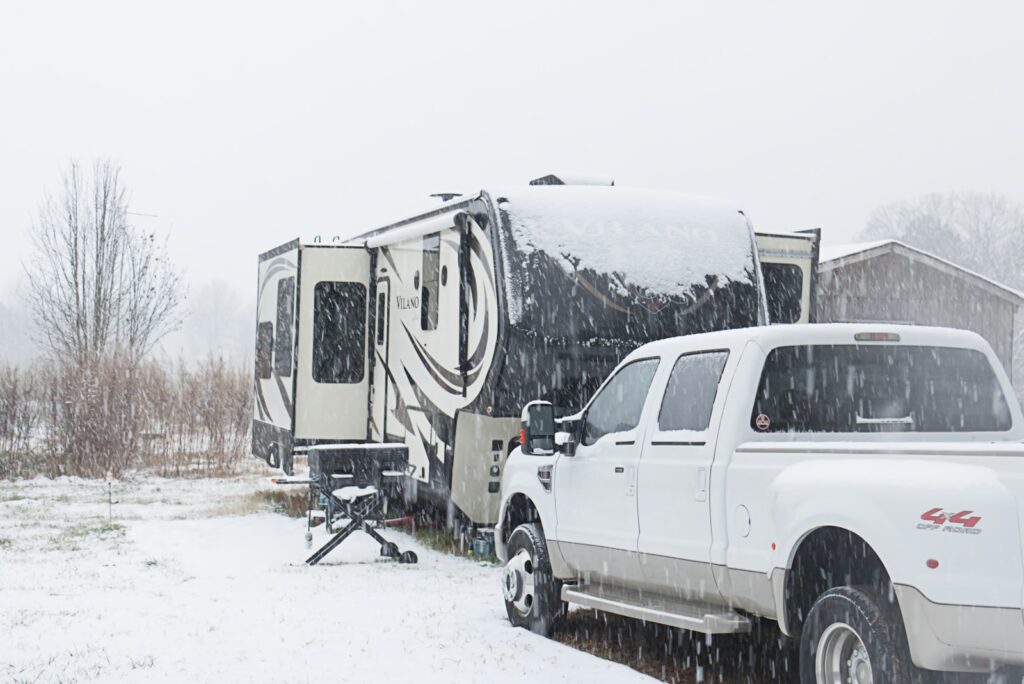
Photo by Jacob McGowin on Unsplash
Introduction to Recreational Vehicles
Recreational vehicles (RVs) have become a cornerstone of the outdoor lifestyle, offering families and adventurers the unique opportunity to explore the world on their terms. The RV industry has seen remarkable growth, with leading manufacturers like Forest River, Thor, and Winnebago shaping the market and responding to the evolving needs of modern travelers.
Today’s RVs come in a wide array of types, including motorhomes, fifth wheels, toy haulers, and travel trailers, each designed to support different lifestyles and travel ambitions.
As the industry continues to expand, RVs have grown from simple campers to sophisticated mobile homes, equipped to handle everything from weekend getaways to cross-country adventures. Understanding the various types and features available is essential for anyone looking to join the vibrant community of RV enthusiasts and make the most of their travel experiences.
Types of RVs
The RV industry offers a diverse selection of vehicles, each tailored to specific travel styles and preferences.
- Class A Motorhome – Large, bus-like RVs built for luxury and long-distance travel.
- Class B Camper Van – Compact van-style RVs ideal for solo or couple travelers.
- Class C Motorhome – Mid-sized RVs with a cab-over bunk and family-friendly layouts.
- Travel Trailer – Towable RVs that attach to a bumper hitch and come in a wide range of sizes.
- Fifth Wheel Trailer – Large towable RVs that connect to a truck bed hitch for added stability.
- Toy Hauler – A travel trailer or fifth wheel with a built-in garage for motorcycles, ATVs, or gear.
- Teardrop Trailer – Ultra-compact trailers with a distinct rounded shape, ideal for minimalist camping.
- Pop-Up Camper – Foldable trailers with canvas sides that expand when parked.
- Truck Camper – Slide-in units that mount onto the bed of a pickup truck.
- Park Model RV (Destination Trailer) – Semi-permanent RVs meant for seasonal stays in one location.
With so many types to choose from, understanding the unique advantages of each helps ensure you select the RV that best fits your travel needs and lifestyle.
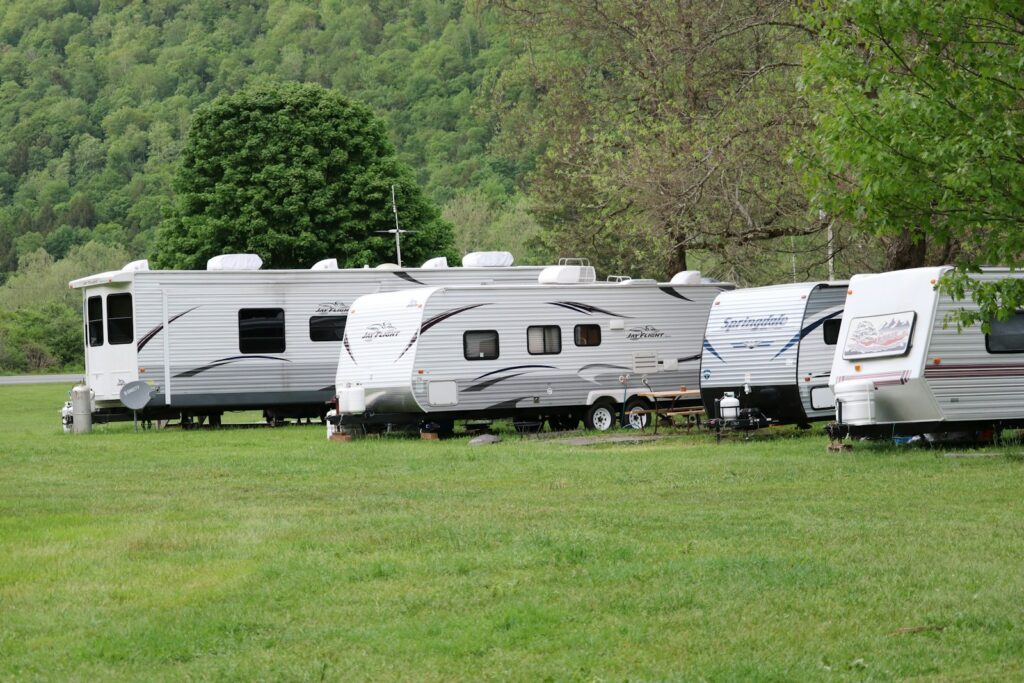
Photo by Izabela Mierzejewski on Unsplash
The Big Three: Major RV Manufacturers Dominating the Market
Thor Industries: Industry Leader with Diverse Portfolio
Thor Industries stands as the largest RV manufacturer in the USA, commanding a significant market share through strategic acquisitions and diverse brand offerings. Founded in 1980, Thor has grown into a powerhouse with manufacturing facilities across the Midwest and beyond.
The company’s portfolio includes popular brands like Airstream, Jayco, Keystone, and Dutchmen. Thor’s motorhomes division produces Class A, B, and C vehicles, while its towable division manufactures travel trailers, fifth wheels, and toy haulers. This diversification allows Thor to serve every segment of the recreational vehicle market. Thor’s builds are recognized for their consistency and craftsmanship, reflecting high construction standards and attention to detail across its various brands.
From a transport perspective, Thor’s standardized construction methods generally result in units that travel well. Their manufacturing facilities employ consistent quality control processes, though individual brand standards can vary within the Thor family.
Forest River: Volume Producer with Broad Appeal
Forest River has established itself as a major force in the RV industry through aggressive expansion and competitive pricing. The company operates numerous manufacturing facilities and produces an extensive range of recreational vehicles under multiple brand names.
Known for offering value-oriented options, Forest River manufactures everything from entry-level travel trailers to high-end luxury coaches. Popular brands under the Forest River umbrella include Cherokee, Wildwood, and Berkshire.
Their toy haulers and fifth wheels are particularly popular among outdoor enthusiasts. Many customers have shared experiences after they have purchased a Forest River RV, with some expressing satisfaction with their new units, while others report issues that surfaced post-purchase.
Transport professionals often encounter Forest River units, and build quality can vary significantly across their extensive product lines. While some models demonstrate excellent construction, others may require additional preparation for safe transport due to varying manufacturing standards.
Winnebago Industries: Heritage Brand with Modern Innovation
Winnebago Industries represents one of the most recognizable names in the RV world. This iconic company has been manufacturing recreational vehicles since 1958, building a reputation for quality construction and innovative design.
The Winnebago brand portfolio includes both motorhomes and towable RVs. Their Class A motorhomes are particularly well-regarded, featuring solid construction that typically handles transport well. Winnebago’s motorhomes consistently receive positive review scores for their quality and reliability from both consumers and industry experts.
The company’s focus on quality control and customer satisfaction has maintained its strong market position despite increased competition.
Winnebago’s manufacturing facilities emphasize precision construction, which translates to units that generally require minimal preparation for transport. Their attention to detail in areas like plumbing and electrical systems reduces the likelihood of transport-related issues.

Photo by Santiago Boada on Pexels
Most Reputable RV Manufacturers: Quality Leaders
Learn About Reputable RV Manufacturers
When evaluating RV manufacturers for reputation and build quality, several brands consistently rise to the top based on customer satisfaction, construction standards, and long-term reliability.
Airstream | The Iconic Travel Trailer
Airstream leads the premium segment with its distinctive aluminum construction and exceptional build quality. These units command high resale values and are built to last decades. From a transport standpoint, Airstream’s robust construction methods result in trailers that travel exceptionally well with minimal risk of damage.
Grand Design | Fifth Wheels Built to Tow Big and Live Bigger
Grand Design has quickly established itself as a quality leader since its founding in 2012, under the parent company Winnebago Industries, Inc. Their attention to detail and customer service have earned them numerous industry awards. The company’s focus on proper construction techniques results in units that transport safely and maintain their value over time.
Newmar Corporation | A Masterpiece on Wheels
Newmar Corporation specializes in luxury motorhomes with meticulous attention to detail. Their Class A coaches are built using automotive-grade materials and processes, resulting in units that handle transport stresses exceptionally well.
Oliver Travel Trailers | The Legacy of Fiberglass
Oliver Travel Trailers produces fiberglass travel trailers with exceptional build quality. Their unique construction methods create incredibly durable units that require minimal maintenance and transport without issues.
These manufacturers distinguish themselves through superior materials, better construction techniques, and comprehensive quality control processes.
While their products typically carry higher price points, the investment often pays dividends in reliability, resale value, and reduced maintenance costs. Take time to understand the differences in quality and construction among these top brands to make an informed decision.
All Major RV Manufacturers To Consider
Whether you’re shopping for your first travel trailer or upgrading to a luxury motorhome, knowing the leading names in the RV industry can help you make a smart investment.
From iconic brands like Airstream and Winnebago to rugged off-grid builders like Northwood and Oliver, each manufacturer brings its own specialty, quality standards, and design approach to the table. You’ll also want to consider price, and find a number amount that you can logically afford before turning the page and buying a new RV.
Here are some of the most trusted RV manufacturers in the U.S. and beyond:
- Airstream – Known for their iconic aluminum travel trailers and touring coaches.
- Winnebago – Offers a wide range of floorplans in motorhomes, camper vans, and travel trailers.
- Forest River – One of the largest RV makers, with multiple brands like Rockwood, Cherokee, and Salem.
- Thor Motor Coach – A leading motorhome manufacturer producing Class A, B, and C RVs.
- Jayco – Offers family-friendly travel trailers, fifth wheels, and motorhomes.
- Tiffin Motorhomes – Renowned for luxury Class A and Class C diesel motorhomes.
- Coachmen RV – Offers affordable and versatile RVs across all categories.
- Newmar – High-end manufacturer known for luxury Class A motorhomes.
- Grand Design RV – Popular for well-built travel trailers and fifth wheels.
- Keystone RV Company – A division of Thor Industries with popular lines like Montana and Cougar.
- Lance Camper – Specializes in travel trailers and truck campers with lightweight construction.
- Entegra Coach – Luxury motorhomes ranging from high-end Class A diesel pushers to Class C models.
- Dutchmen RV – Offers a wide range of towable RVs, including Aspen Trail and Kodiak lines.
- Heartland RV – Known for its fifth wheels and toy haulers like Bighorn and Cyclone.
- Pleasure-Way – Specializes in high-quality Class B camper vans.
- Roadtrek – A popular Class B RV manufacturer offering compact, fully-equipped camper vans.
- DRV Luxury Suites – Builds upscale fifth wheels, ideal for full-time RVers.
- Northwood Manufacturing – Offers rugged travel trailers and truck campers designed for off-grid travel.
- Oliver Travel Trailers – High-end fiberglass trailers known for durability and sleek design.
- Nexus RV – Manufactures Class B+ and Super C motorhomes.
Once you’ve narrowed down the brand, it’s time to consider what really sets today’s RVs apart—modern features, smart technology, and creative space-saving designs. From solar-ready setups and WiFi boosters to outdoor kitchens and slide-out expansions, the newest innovations make life on the road more comfortable than ever.
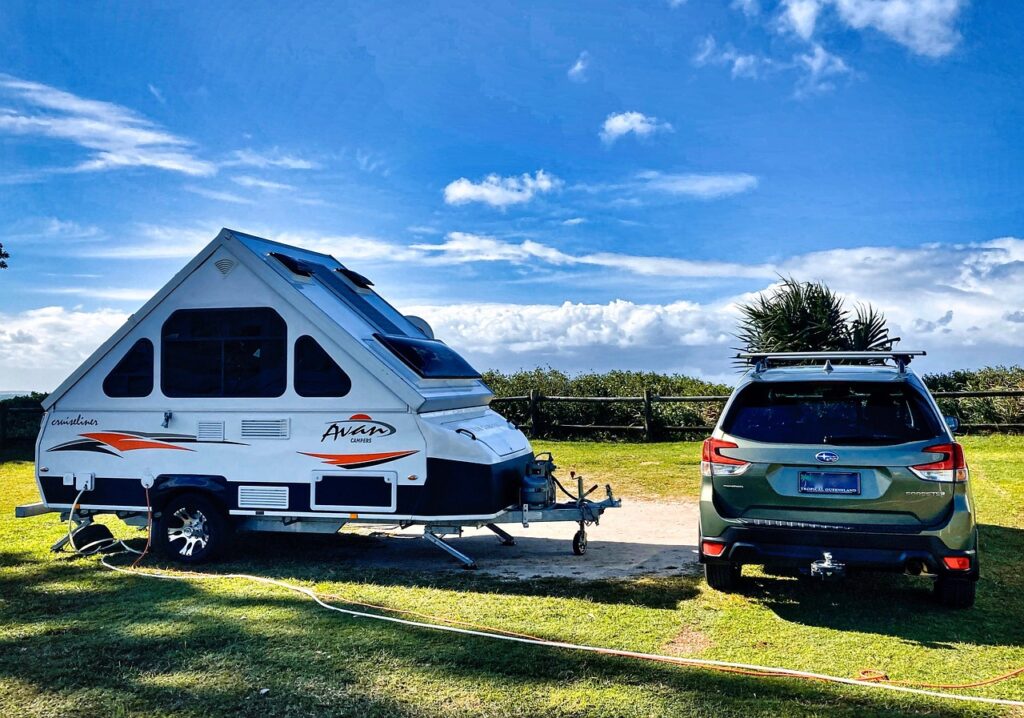
Photo by MemoryCatcher on Pixabay
RV Features and Innovations
Modern rv manufacturers are constantly innovating to enhance the comfort, safety, and convenience of their vehicles. Today’s rvs often feature advanced electrical and plumbing systems, allowing for reliable off-grid living and easy maintenance.
Safety and security are top priorities, with many units equipped with state-of-the-art alarm systems, smoke and carbon monoxide detectors, and reinforced construction for added peace of mind. Luxurious amenities such as full kitchens, spacious bathrooms, and high-quality sleeping quarters have become standard in many models, making it easier than ever to enjoy a home-like experience on the road.
The integration of smart technology, including mobile apps and wireless connectivity, allows owners to monitor and control various systems remotely, from lighting and climate to security features. As you research different models, comparing these features and innovations will help you find an RV that matches your expectations for comfort, safety, and convenience.
Understanding the 10-Year Rule for RVs
The 10-year rule significantly impacts RV ownership and transport options. This regulation, enforced by many campgrounds, RV parks, and transport companies, restricts access for recreational vehicles over 10 years old. Understanding this rule is crucial for both current and prospective RV owners.
Many premium campgrounds and RV resorts implement age restrictions to maintain a certain aesthetic and reduce the likelihood of mechanical issues or unsightly units in their facilities. While the rule varies by location, it generally applies to the manufacture date rather than model year.
For example, an owner who has had their RV for a year and a half may already be thinking about how the 10-year rule will affect their future travel plans and campground choices. From a transport perspective, the 10-year rule affects available carriers and costs. Some transport companies refuse to haul older units due to increased liability risks and potential mechanical issues during transport. This limitation can significantly impact resale options and relocation flexibility for older RV owners.
However, exceptions exist for well-maintained units and certain premium brands. High-quality manufacturers like Airstream often receive exemptions due to their reputation for durability and maintained appearance regardless of age. Some facilities evaluate units individually rather than applying blanket age restrictions.
Planning for the 10-year rule should influence your initial purchase decision. Choosing a reputable manufacturer with strong build quality and timeless design can help maintain access to premium facilities and transport options throughout your ownership experience.
Largest RV Manufacturer in the USA: Thor Industries Deep Dive
Thor Industries maintains its position as America’s largest RV manufacturer through strategic acquisitions, diverse product offerings, and extensive manufacturing capabilities. The company operates multiple manufacturing facilities across Indiana, Ohio, Oregon, and other states, producing thousands of units annually.
Thor’s manufacturing facilities employ modern production techniques while maintaining the craftsmanship traditions that define quality recreational vehicles. Their Elkhart, Indiana campus serves as the heart of their operations, where multiple brands are produced under one roof.
This concentration of manufacturing allows for shared resources, quality control systems, and efficient distribution networks. Thor’s in-house construction processes ensure that the house components—such as interior walls, cabinetry, and internal frameworks—are built to high standards, contributing to both the durability and customization options available in their RVs.
The company’s approach to manufacturing emphasizes both volume production and quality control. Each facility maintains specific standards for construction, materials, and finishing. This standardization helps ensure consistent build quality across their extensive product lines, though individual brands within the Thor family may have varying quality levels.
Thor’s distribution network spans the entire country, with dealerships and service centers strategically located to support their customer base. This extensive network provides advantages for both initial purchases and ongoing maintenance needs. The company’s size also enables it to negotiate better pricing on materials and components, often passing savings to consumers.
From a transport perspective, Thor’s large-scale operations mean their units are regularly moved across the country. Professional transport companies are familiar with Thor products and their specific handling requirements. The company’s standardized construction methods generally result in units that transport well when properly prepared.
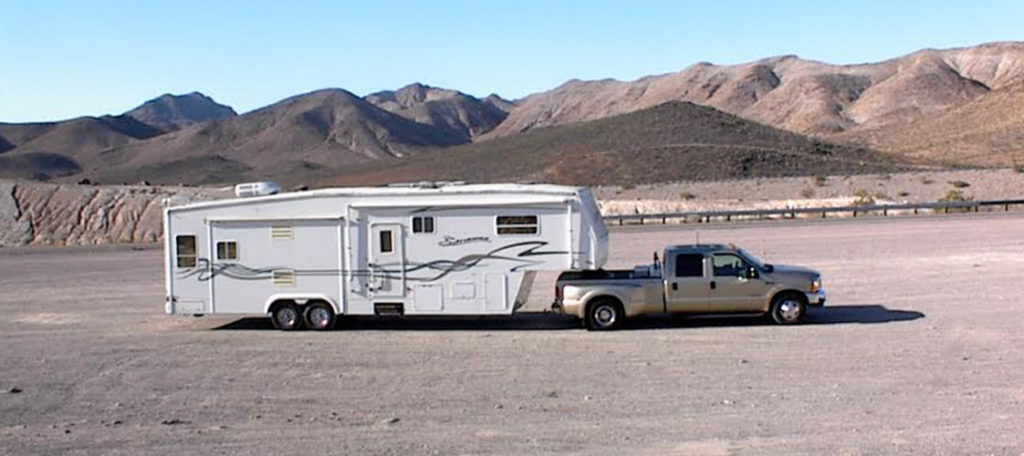
Professional RV Transport: What You Need to Know
Professional RV transport services play a crucial role in the recreational vehicle industry, moving units from manufacturing facilities to dealerships, between owners, and to seasonal destinations. Understanding transport considerations helps RV owners make informed decisions about their vehicles and service providers.
Preparing Your RV for Transport
Proper preparation significantly reduces the risk of transport damage. Remove or secure all loose items inside the RV, including dishes, decorations, and personal belongings. Retract awnings completely and ensure all exterior compartments are locked. Check tire pressure and inspect the electrical system, particularly brake lights and turn signals.
For motorhomes, disable alarm systems and ensure the steering wheel is unlocked. Remove any items from exterior storage compartments and secure slide-outs in the closed position. Document the RV’s condition with photographs before transport to establish a baseline for any damage claims. Completing all pre-transport inspections is essential to ensure a smooth and trouble-free transport process.
Transport Costs and Logistics
Several factors influence RV transport costs, including distance, route difficulty, seasonal demand, and unit specifications. Larger units require specialized equipment and may face route restrictions, increasing transport costs. Peak season typically runs from spring through early fall when demand is highest.
Route considerations include bridge heights, weight restrictions, and permit requirements for oversized loads. Professional transport companies like Interstate Haulers have the expertise to navigate these challenges and ensure safe delivery.
Specialized Equipment Requirements
Transporting RVs, especially fifth wheels and travel trailers, often requires specialized equipment. Fifth wheels are designed for easy hitching and provide excellent stability during tow, making them a popular choice for both family travel and full-time living.
Choosing a Transport Provider
Selecting the right transport company requires careful evaluation of their experience, insurance coverage, and reputation. Look for companies that specialize in RV transport and maintain proper licensing and insurance. Verify their track record through customer reviews and industry certifications.
Professional transport companies should provide detailed contracts outlining pickup and delivery dates, insurance coverage, and liability provisions. They should also conduct thorough pre-transport inspections and maintain communication throughout the transport process.

RV Quality and Reliability: Insights from Transport Professionals
Years of moving recreational vehicles across the country provide unique insights into manufacturer quality and common issues. Transport professionals encounter hundreds of RVs annually, giving them firsthand knowledge of which brands and models handle transport stresses best.
Common Issues Identified During Transport
Certain problems appear consistently across different manufacturers and model years. Poorly secured interior fixtures often shift during transport, causing damage to cabinets, appliances, and trim pieces. Inadequate structural bracing can result in frame flexing that leads to door and window misalignment.
Exterior components frequently suffer from insufficient mounting hardware. Awnings, air conditioning units, and storage compartment doors may become loose or damaged during transport if not properly secured.
These issues often indicate shortcuts in manufacturing processes or inadequate quality control. Some tricks used by transport professionals to prevent these common issues include double-checking fasteners, using additional bracing, and securing loose items before the journey.
Plumbing and electrical systems represent another common problem area. Poorly routed lines may rub against frame members or other components during transport, leading to leaks or electrical failures. Quality manufacturers route these systems properly and provide adequate protection from movement-related damage.
Manufacturer Quality Patterns
Transport professionals consistently observe quality differences between manufacturers. Premium brands like Airstream, Grand Design, and high-end Thor products typically arrive with minimal issues. Their superior construction methods and materials result in units that handle transport stresses without problems.
Conversely, entry-level products from various manufacturers often exhibit quality issues that become apparent during transport. These may include loose trim pieces, inadequately secured appliances, or structural flexing that suggests insufficient framing.
Mid-range products show the most variation in quality, even within the same manufacturer’s lineup. This inconsistency suggests that quality control processes may vary between production lines or manufacturing facilities.
Long-Term Ownership Considerations
The same construction issues that create transport problems often translate to long-term reliability concerns. Units that suffer damage during transport may continue to experience problems throughout their ownership lifecycle.
Investing in better initial quality typically pays dividends in reduced maintenance costs and higher satisfaction. A reliable RV not only reduces headaches but also helps families create lasting memories on the road, turning each trip into a collection of shared experiences.
Regular maintenance becomes particularly important for RVs that have experienced transport-related issues. Professional inspections can identify developing problems before they become major failures. Quality manufacturers often provide better warranty support and parts availability for long-term ownership.
Transportation Logistics: Getting Your RV Where It Needs to Go
The complexity of RV transportation extends beyond simply moving units from point A to point B. Professional transport requires careful planning, specialized equipment, and experienced personnel to ensure safe delivery.
Specialized Equipment Requirements for Toy Haulers & Other RVs
Toy haulers are a favorite among adventurers for good reason—they combine living comfort with built-in garage space, making them perfect for hauling ATVs, motorcycles, bikes, kayaks, and more. With features like fold-down ramp doors, convertible cargo areas, and reinforced floors, toy haulers offer unmatched versatility for those who love to bring their gear along for the ride.
Because of their larger size and rear-heavy weight distribution, toy haulers may require specialized towing considerations. It’s important to use a truck with the proper hitching system and towing capacity to ensure safe and stable travel. Transport professionals also factor in weight distribution to maintain handling and safety on the road.
Whether you’re headed to the dunes, the mountains, or the track, toy haulers deliver the freedom to bring your lifestyle with you—without sacrificing space, comfort, or capability.
Route Planning and Permits
Professional transport companies invest significant time in route planning to avoid problematic areas. This includes identifying bridges with insufficient clearance, roads with weight restrictions, and areas where permits are required for oversized loads.
State and local regulations vary significantly, requiring transport companies to maintain current knowledge of changing requirements. Professional services handle all necessary permits and route approvals, ensuring legal compliance throughout the transport process.
Seasonal Considerations
Weather significantly impacts RV transport schedules and safety. Winter conditions can delay shipments and increase risks, particularly for tall units vulnerable to crosswinds. Professional companies monitor weather patterns and adjust schedules accordingly.
Peak season demand affects both availability and pricing. Planning transport during off-peak periods can result in better pricing and more flexible scheduling options.
To make scheduling transport easy, most providers allow customers to fill out a simple online form on their website to request service.
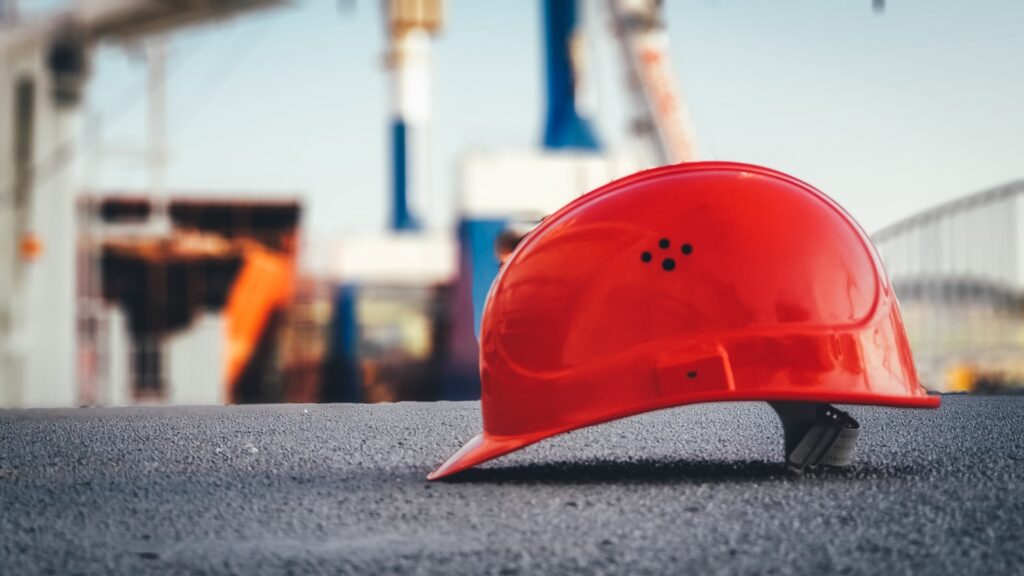
RV Safety and Security
Safety and security are fundamental considerations for any rv owner, and manufacturers are dedicated to building vehicles that protect both occupants and their investment. High-quality construction, including robust frames and secure storage solutions, ensures that rvs can withstand the rigors of travel and provide a safe environment on the road.
Advanced safety features such as anti-lock braking systems, stability control, and emergency exit windows are increasingly common, reflecting the industry’s commitment to occupant protection. Security enhancements, like reinforced entry doors, high-quality locks, and optional surveillance cameras, help deter theft and provide peace of mind whether you’re parked at a campground or exploring remote destinations.
By choosing an rv from a reputable manufacturer and staying proactive about maintenance and security upgrades, you can enjoy your adventures with confidence, knowing that your vehicle is built to keep you and your loved ones safe.
RV Financing and Insurance
Investing in an RV is a significant decision, and understanding your financing and insurance options is key to a smooth ownership experience. Many manufacturers and dealerships offer flexible financing solutions, including loans and lease programs, to help make rv ownership more accessible.
Specialized RV insurance policies are also available, providing coverage for damages, liability, and unique risks associated with recreational vehicles. It’s important to research and compare offers from different providers to secure the best rates and coverage for your needs.
Carefully reviewing the terms and conditions of your financing and insurance agreements can help you avoid unexpected expenses and ensure that you’re fully protected on the road. By taking the time to explore your options and make informed choices, you can enjoy the freedom and adventure of RV ownership with greater financial confidence.
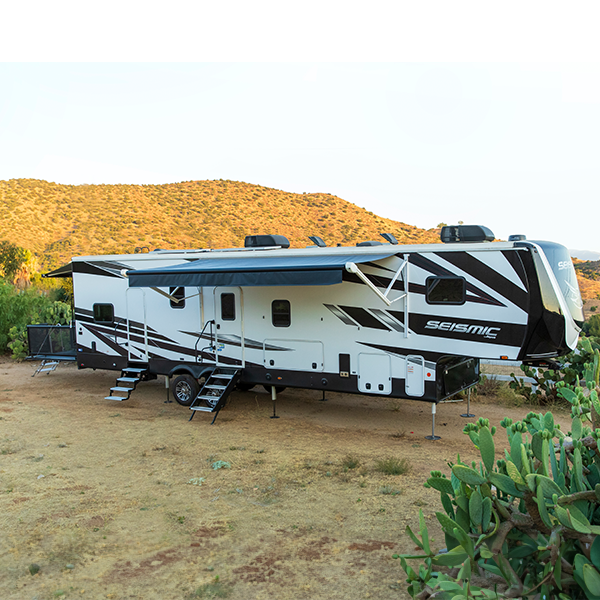
“Jayco RV – Toy Hauler” by Anshamblen15 is licensed under CC BY-SA 4.0
Making the Right Choice: Manufacturer Selection Strategy
Selecting the right RV manufacturer requires balancing multiple factors including budget, intended use, quality expectations, and long-term ownership plans. Understanding these considerations helps narrow the field and identify manufacturers that align with your specific needs.
Budget Considerations
Entry-level manufacturers like some Forest River brands offer affordable access to RV ownership but may require more maintenance and have shorter useful lives. Mid-range options from manufacturers like Jayco and Keystone provide better balance between price and quality.
Premium manufacturers command higher prices but typically offer superior construction, better materials, and longer useful lives. When factoring in depreciation, maintenance costs, and resale values, premium options often provide better long-term value.
For example, someone who recently bought a new RV shared that considering long-term maintenance and resale value was crucial in their decision-making process.
Intended Use Patterns
Weekend warriors may find entry-level units adequate for their limited use patterns. However, full-time RVers should prioritize build quality and reliability due to the constant stresses of continuous use.
Seasonal users who store their RVs for extended periods should consider manufacturers known for durable construction that withstands storage-related stresses.
Units that will be transported frequently benefit from manufacturers with superior structural integrity. If you have kids, it’s important to choose RVs with features and layouts that are safe, comfortable, and convenient for families.
Research and Evaluation Process
Thorough research should include manufacturer reputation, specific model reviews, warranty coverage, and dealer network quality. Industry publications, owner forums, and professional reviews provide valuable insights into real-world performance. Owner communities are filled with helpful advice and support for both new and experienced RVers.
Many of these owner groups were formed specifically to support new buyers and share experiences. RV travel also fosters a strong connection among family members, as shared adventures help build lasting bonds. Some unique RV models or features are available in Australia, so international options may be worth considering.
Factory tours can provide insights into manufacturing processes and quality control procedures. Many manufacturers offer tours that showcase their construction techniques and materials selection.

Ready to Transport Your RV?
Choosing the right RV manufacturer is just the beginning of your recreational vehicle journey. Whether you’re purchasing a new unit from a dealership or relocating your current RV, professional transport services ensure safe delivery and peace of mind.
The recreational vehicle industry offers numerous manufacturers, each with distinct strengths and specializations. From Thor Industries’ diverse portfolio to boutique manufacturers focused on premium quality, options exist for every budget and application.
Understanding manufacturer differences, construction quality indicators, and transport considerations helps you make informed decisions that enhance your RVing experience. Here are some tips: prepare your RV by securing all loose items, check tire pressure, and research transport providers’ reviews and insurance coverage before making your choice.
Professional transport companies like Interstate Haulers bring years of experience moving recreational vehicles safely across the country. Their expertise in handling different RV types, understanding route requirements, and managing logistics ensures your investment arrives safely at its destination.
Don’t let transport concerns delay your RV dreams. Contact professional transport services today for a free quote and discover how easy it can be to get your recreational vehicle exactly where you need it.
